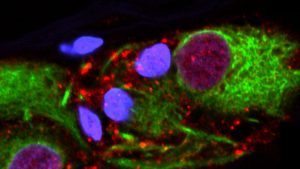Kelly Servick in Science:
 The appendix has a reputation of being useless at best. We tend to ignore this pinkie-size pouch dangling off our large intestine unless it gets inflamed and needs cutting out. But a new study suggests this enigmatic organ in the gut harbors a supply of a brain-damaging protein involved in Parkinson’s disease—even in healthy people. The study is the largest yet to find that an appendectomy early in life can decrease a person’s risk of Parkinson’s or delay its onset. “It plays into this whole booming field of whether Parkinson’s possibly starts in the gut,” says Per Borghammer, a neuroscientist at Aarhus University in Denmark who was not involved in the study. “And that would be a radical change in our understanding of the disease.” Look inside the brain of a person with Parkinson’s and you’ll find clumps of a misfolded form of a protein known as α-synuclein (αS). The protein’s normal function isn’t fully clear, but in this clumpy state, it may damage and kill neurons, including those near the base of the brain that help control movement. The results are the hallmark tremors and body rigidity of Parkinson’s.
The appendix has a reputation of being useless at best. We tend to ignore this pinkie-size pouch dangling off our large intestine unless it gets inflamed and needs cutting out. But a new study suggests this enigmatic organ in the gut harbors a supply of a brain-damaging protein involved in Parkinson’s disease—even in healthy people. The study is the largest yet to find that an appendectomy early in life can decrease a person’s risk of Parkinson’s or delay its onset. “It plays into this whole booming field of whether Parkinson’s possibly starts in the gut,” says Per Borghammer, a neuroscientist at Aarhus University in Denmark who was not involved in the study. “And that would be a radical change in our understanding of the disease.” Look inside the brain of a person with Parkinson’s and you’ll find clumps of a misfolded form of a protein known as α-synuclein (αS). The protein’s normal function isn’t fully clear, but in this clumpy state, it may damage and kill neurons, including those near the base of the brain that help control movement. The results are the hallmark tremors and body rigidity of Parkinson’s.
But gastrointestinal symptoms—especially constipation—are also common in Parkinson’s patients, and can appear decades before other problems. Scientists have found that people are less likely to get Parkinson’s if they’ve had a vagotomy, a treatment for stomach ulcers that severs the vagal nerve, which branches down from the brain into various tissues of the gut. That finding feeds a still-controversial theory, proposed more than a decade ago by neuroscientist Heiko Braak, that the seeds of Parkinson’s disease somehow climb up out of the gut and into the brain. “It’s kind of like the telephone game,” explains John Woulfe, a neuropathologist at the Ottawa Hospital Research Institute. Dysfunctional αS spreads up the fibers of the vagal nerve, the theory goes, by converting healthy forms of the protein to misfolded, clumpy ones.
In the new study, neuroscientist Viviane Labrie and her team at the Van Andel Institute in Grand Rapids, Michigan, decided to zero in on the appendix. Though it’s not necessary for life, it may not be completely useless; the organ holds immune cells that may help coordinate the gut’s response to pathogens, and bacteria that may help maintain a healthy balance of gut microbes. (Inflammation and microbiome disturbances are both proposed factors in Parkinson’s risk.) Four recently published studies looked for evidence that people who get appendectomies are less likely to get Parkinson’s; three couldn’t find it, but Labrie’s team did. “This study accomplishes what those studies lacked,” Woulfe says—a large group of people tracked over a sufficiently long time. It relies on a national registry that has logged medical records for 1.7 million Swedish citizens since 1964. There is roughly a 1% chance that a person will develop Parkinson’s after age 65, but for the Swedes who had an appendectomy, the risk of developing the disease was about 20% lower than for those who kept their appendix, the researchers report today in Science Translational Medicine.
More here.
